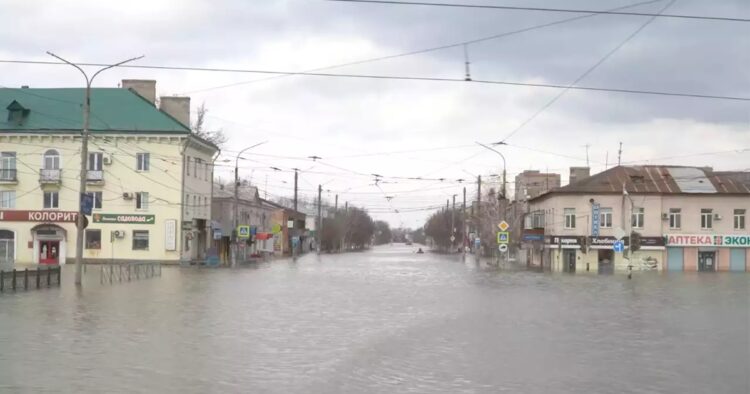In parts of Russia and Kazakhstan, people are facing one of the worst floods in nearly a century. The flooding is mainly due to rivers overflowing from melting snow and heavy rains. More than 110,000 people had to leave their homes, with many cities submerged underwater.
One affected area is Orenburg, a city in Russia with a population of about 550,000. Residents had to flee quickly as the water levels of the Ural River rose rapidly, leaving little time to gather belongings. Some described the situation as coming upon them unexpectedly during the night.
The rising water levels have caused significant damage, with parts of Orenburg completely submerged. The Ural River surpassed safe levels by a staggering 49 inches, prompting officials to issue warnings of further increases in water levels.
The flooding isn’t limited to Orenburg. It has also impacted regions like the Urals, Siberia, and southern parts of Western Siberia. Cities such as Tomsk and Kurgan are experiencing rising waters, putting more communities at risk.
In some areas, residents are expressing frustration over the handling of the situation by local officials. After a dam on the Ural River burst in Orsk, upstream from Orenburg, some people demanded better compensation and assistance from President Vladimir Putin. However, the Kremlin stated that Putin is being updated but currently has no plans to visit the affected areas.
In Orenburg, there’s disappointment among residents that local authorities didn’t adequately prepare for the annual snow melt, which contributes to the flooding. Mayor Sergei Salmin acknowledged the concerns and highlighted the need for effective compensation and support procedures.
Experts attribute the severity of this year’s flooding to a combination of factors, including saturated soils before winter and rapid snow melting due to rising spring temperatures and heavy rains. Climate researchers warn that such extreme weather events could become more frequent due to rising temperatures, underscoring the global importance of managing climate change.
Kazakhstan is also grappling with the aftermath of the floods, with over 97,000 evacuees and a state of emergency declared in eight regions. The government is actively working to remove water from flooded areas and has restricted movement on several roads in affected regions.
The situation remains challenging as both Russia and Kazakhstan work to mitigate the impact of the floods and provide support to affected communities.

















Comments